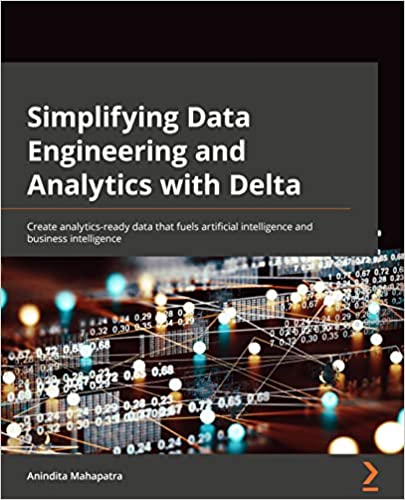Anindita Mahapatra is the author of Simplifying Data Engineering and Analytics with Delta. We got the chance to sit down with Anindita and find out more about her experience of writing with Packt.
Q: What are your specialist tech area(s)?
Anindita: Bigdata & Analytics
Q: How did you become an author for Packt? Tell us about your journey. What was your motivation for writing this book?
Anindita: A little bit of serendipity. I was not actively thinking nor looking to be an author, it just happened to come my way coincidentally and because the timing was right, I got on without any hesitation. I had started teaching a Data Engineering course that fall and realized that a lot of material is created for ML/Analytics and is not focused on the Data Engineering aspects. If the data is not ready, all AI and BI on top of it will be incomplete and inaccurate. Data Engineering is the backbone of analytics and Delta is a foundational brick that helps simplify it which is why I decided to focus on those aspects and bring relevant pieces into a book for easy consumption by people starting out on a data and AI initiative. The other thing that often gets neglected is a business need that is solved by a tech solution, without marrying the two together and understanding what success looks like and how it can be measured, tech solutions may never make it to production or may have a very short shelf life. That is the other aspect this book addresses by applying tech in the context of use cases to solve a business challenge.
Q: What kind of research did you do, and how long did you spend researching before beginning the book?
Anindita: Surveys with the student community and working professionals to understand what they want to know and learn and what will make them successful practitioners in the field. Looking at the courses and books and other content that prepares them to make the transition from the academic world to the corporate world where they can hit the ground running, apply concepts and show value.
Q: Did you face any challenges during the writing process? How did you overcome them?
Anindita: Some topics are dry and some areas are difficult to condense. Using case studies, examples, short code snippets, and elucidating using diagrams addressed some of those.
Q. What’s your take on the technologies discussed in the book? Where do you see these technologies heading in the future?
Anindita: Delta is an open protocol that is being rapidly adopted by several other vendors and tools proving its growing popularity with the larger data community. Databricks may have been the original creator but it is the Linux Foundation that owns it and people in the open-source community contribute to it making it robust and feature-rich.
Q: Why should readers choose this book over others already on the market? How would you differentiate your book from its competition?
Anindita: The litmus test for any technology is the ease of use apart from its features and performance. The book focuses on Data Engineering as the backbone for any analytic use case. Delta is portrayed as the fundamental building block toward creating robust big data and ML pipelines. Use Cases from industry verticals are presented to make the connection between business and tech applications.
Q. What are the key takeaways you want readers to come away from the book with?
Anindita: Data is the new oil that needs to be refined before it can be used. Delta is the protocol that simplifies this refining process and offers greater agility to data personas to take their data initiatives into production by offering better reliability, performance, and quality on the data being operated upon.
Q. What advice would you give to readers learning tech? Do you have any top tips?
Anindita: Reading’ helps keep up with the latest tools and technologies but ‘doing’ actually makes you better at it. Find time to experiment and see for yourself.
Q. Can you share any blogs, websites, and forums to help readers gain a holistic view of the tech they are learning?
Anindita: https://delta.io/
Q. How would you describe your author journey with Packt? Would you recommend Packt to aspiring authors?
Anindita: Working with PACKT was an enjoyable experience and I would recommend it to my other fellow writers contemplating embarking on their book-writing journey. They have a great team and a good methodology in place to help at different points in the writing process, right from drafting the outline, to technical review and book promotion. It is flexible with the right amount of support, reminders, and touch-points to get you from start to finish.
Q. What are your favorite tech journals? How do you keep yourself up to date on tech?
Anindita: Medium articles are great; Local Meetups are also a great way to be part of a community and contribute back;
Q. How did you organize, plan, and prioritize your work and write the book?
Anindita: I was already teaching the ‘Data Engineering for Analytics to Solve Business Problems’ at the Harvard Extension School. I used the outline of what was most useful and effective and focused on the Delta aspects that simplified the heavy lifting around data engineering.
Q. Any writing tips that you found most crucial and would like to share with aspiring authors?
Anindita:
1) Start with a mind map to organize your thoughts and ideas. This helps with the storytelling aspects. I personally use mindmeister.com and find it incredibly useful
2) Use a visualization tool to draw diagrams and pictures. I use Lucid charts which offers a lot of templates and is very flexible.
3) Tech topics can be dry, so apart from visualizations, using analogies, helps the reader make metal connections that stick.
4) Start the process, perfection could be an enemy, so set timelines and produce drafts that you can always iterate over.
Q. Would you like to share your social handles? If so, please share.
Anindita: https://www.linkedin.com/in/aninditamahapatra/
You can find Anindita’s book on Amazon by following this link: Please click here.










